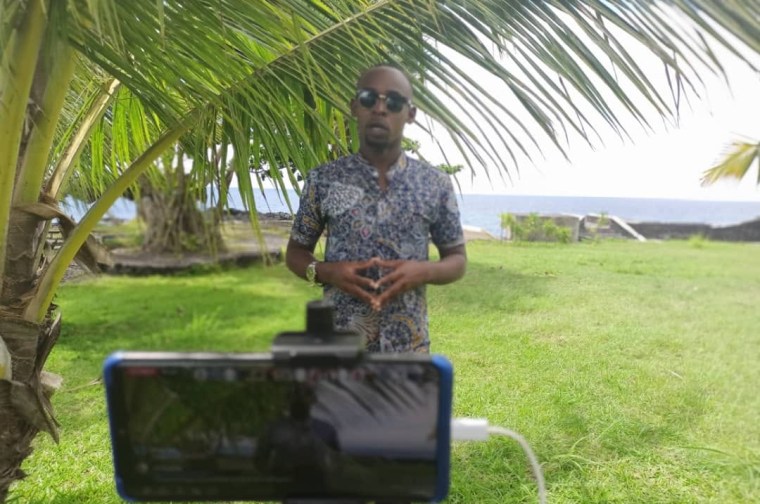New York, December 22, 2020 — Comorian authorities should drop all legal proceedings against journalist Oubeidillah Mchangama and allow him to report freely, the Committee to Protect Journalists said today.
On December 14, Comorian authorities arrested Oubeidillah, a reporter with Facebook-based news outlet FCBK FM, and held him at a remand center in Moroni, the capital, until December 17, according to FCBK FM, news reports, a Facebook post by local journalist Faïza Soulé Youssouf, and Oubeidillah, who spoke to CPJ over messaging app.
He was initially detained in relation to a December 11 FCBK FM post about a potential gas shortage, which authorities allege disturbed “public order,” according to those reports.
On December 16, however, a Moroni court judge dropped the arrest warrant for that post and instead prolonged Oubeidillah’s detention in relation to a September 2020 FCBK FM post he wrote about alleged government mismanagement of public funds, which the court said constituted spreading false news, according to Oubeidillah, reports by the privately owned news website La Gazette des Comores, and a Facebook post by Youssouf.
Now free on provisional release, authorities are investigating Oubeidillah in connection to the September FCBK FM report, according to those sources and a September 3 statement by the National Union of Journalists in the Comoros, published when authorities initially opened an investigation into that report.
If convicted of “spreading false news,” a criminal offense under Article 254 of Comoros’ penal code, he could face up to three years in prison and a fine of 750,000 Comorian francs ($1,853).
Oubeidillah told CPJ today that his next court date had not been scheduled.
“Authorities in Comoros should immediately halt the legal harassment of journalist Oubeidillah Mchangama and ensure he and FCBK FM can report about issues of public interest without fear of arrest or detention,” said Angela Quintal, CPJ’s Africa program coordinator, in Durban, South Africa. “Oubeidillah Mchangama’s arrest and days behind bars fits a continent-wide trend of authorities criminalizing journalism published online and the use of false news allegations against the press.”
On December 12, gendarmerie officers summoned Oubeidillah and interrogated him for about two hours about the December 11 FCBK FM post, after which he was released but instructed to return on December 14, when they detained him, according to Oubeidillah, La Gazette des Comores, and two posts about his arrest and release by FCBK FM.
On December 15, the investigating magistrate told Oubeidillah that the judicial control related to the September 2020 case had been “revoked,” meaning that he was being held at the judge’s discretion while other allegations were investigated, according to FCBK FM, Oubeidillah, and Oubeidillah’s lawyer, Fahmi Said Ibrahim, who spoke to CPJ over the phone.
Included in the September 2020 judicial control order, a copy of which CPJ reviewed, are instructions for Oubeidillah not to make declarations to the media or publish messages on social media. Said Ibrahim told CPJ that he believed the restrictions on Oubeidillah’s work were unconstitutional.
The order also referenced Sections 44 and 45 of the penal code, which pertain to complicity in criminal offenses, and said “there was not sufficient proof against the accused.”
On December 15, Faïza posted a video on Facebook of a protest outside the courthouse calling for Oubeidillah’s release.
A similar protest took place on December 5, 2019, following Oubeidillah’s previous arrest for reporting on a demonstration by women in the capital, according to a Facebook post by Toufeyli Maecha, the editor of La Gazette des Comores, and CPJ reporting from the time. Oubeidillah was also arrested in February 2019 alongside fellow FCBK FM reporter Abdallah Abdou Hassane, as CPJ documented at the time.
CPJ sent a request for comment via messaging app and text message to the public prosecutor associated with Oubeidillah’s case, but did not receive any responses.
